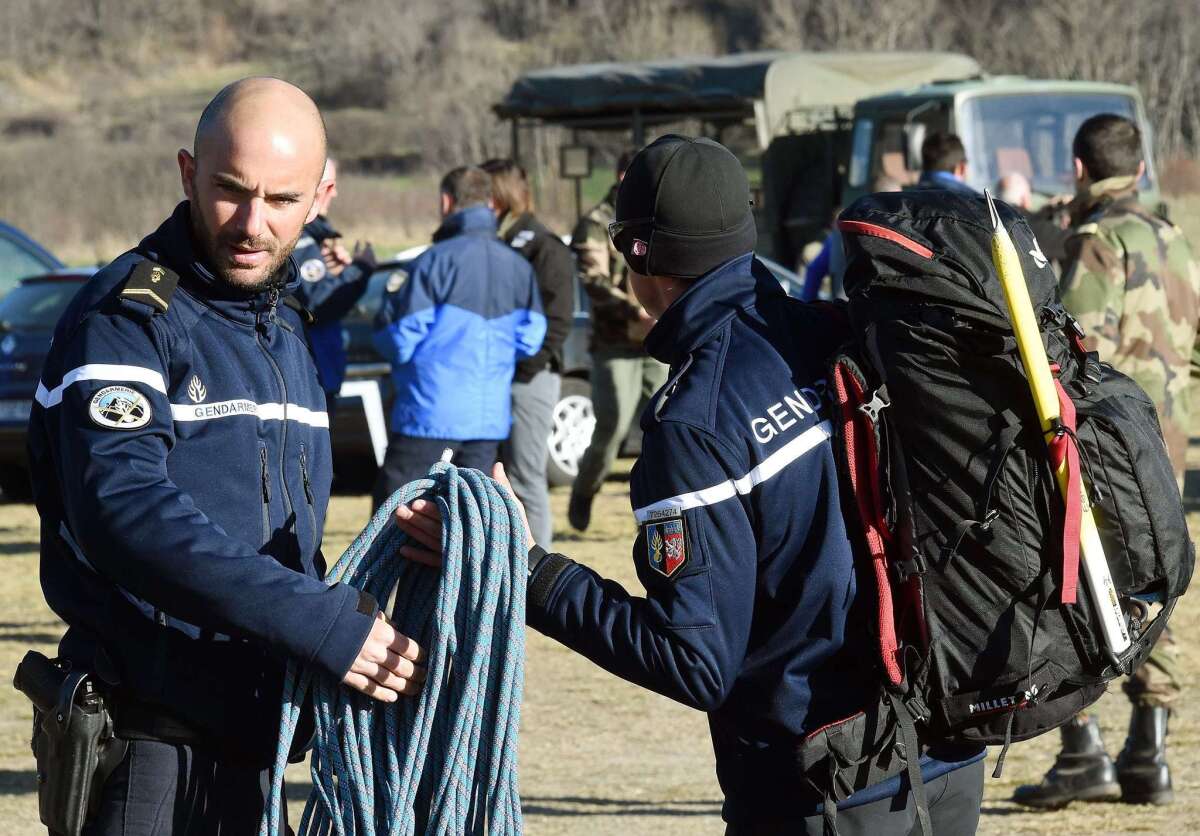Germanwings crash: Data recorder found; copilot researched suicide

- Share via
Reporting from Berlin — The copilot of Germanwings Flight 9525, accused of intentionally crashing the passenger jet in the French Alps and killing all 150 people aboard, searched online for information about suicide methods and cockpit door security systems, German prosecutors said Thursday.
The revelation came as French officials announced that searchers had found the plane’s flight data recorder at the site of the March 24 crash.
Investigators reviewing evidence taken from copilot Andreas Lubitz’s apartment in the German city of Duesseldorf traced his search engine history on his personal tablet from March 16 to March 23.
The copilot “concerned himself on one hand with medical treatment methods, on the other hand with types and ways of going about a suicide,” German prosecutor Ralf Herrenbrueck said in a statement.
“On at least one day the person in question also spent several minutes with search terms about cockpit doors and their security arrangements,” the statement added.
German newspaper Bild reported that Lubitz told his doctors that he was on sick leave and concealed the fact that he was still flying. According to Bild, Lubitz was seeking treatment for trauma and vision problems following a car accident at the end of 2014.
Documents from Germany’s air transport regulator later revealed that Lubitz had sought psychiatric help for a bout of serious depression in 2009 and was still getting assistance from doctors.
Meanwhile, French public prosecutor Brice Robin confirmed that the aircraft’s second “black box,” the digital flight data recorder, had been found at the crash site.
“This ‘black box’ was the same color as the rock,” he said. “It was found to the left of a ravine that had already searched but it was embedded. It had to be dug out. It had obviously been in fire, because it is charred. However, its general state leads us to hope there is a possibility that it can be exploited.”
He said the device should contain 500 flight records tracing air speed, altitude, engine status and other technical data that are vital “for finding out the truth” behind the Airbus A320 crash.
The flight recorder was being flown to Paris on Thursday evening for examination by experts at the French air accident investigation bureau, he said.
“It will give us all the details of the flight itself from its departure from Barcelona to the crash, and above all the actions of the pilot,” Robin said. “It will tell us if there was only one pilot operating at the time of the crash ... it’s a complement to us understanding the final minutes of this flight.”
Audio recordings obtained from the previously discovered cockpit voice recorder prompted French prosecutors to surmise that Lubitz locked the airliner’s pilot out of the cockpit before intentionally crashing the plane into a mountainside in the southern Alps.
The prosecutor said 40 mobile telephones had been found in the wreckage, all of them in a “very bad state.” This information came 24 hours after the French magazine Paris Match and German newspaper Bild claimed they had seen a video from a mobile phone SIM card made by a passenger in the final moments of the doomed flight. Their assertion has been disputed by authorities.
Robin added that search teams had found 2,285 DNA strands providing 150 different “profiles,” but he insisted that only long and painstaking work to match the post mortem DNA with that of the victims would show if all had been identified.
Special correspondent Hassan reported from Berlin and Willsher from Paris.
More to Read
Sign up for Essential California
The most important California stories and recommendations in your inbox every morning.
You may occasionally receive promotional content from the Los Angeles Times.













